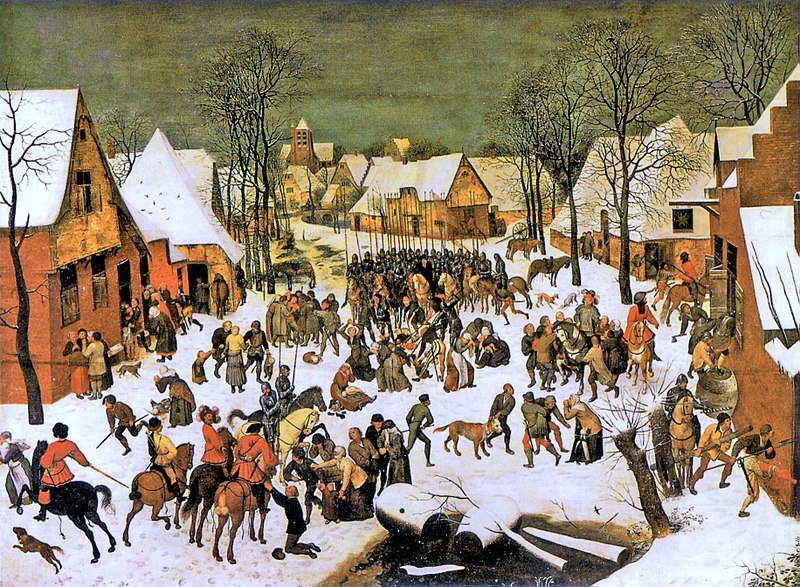|
Remembering Breughel’s Massacre of the Innocents
I should have known it hung there, in Vienna. But home was the place for warnings of strangeness, of not taking rides, or candy. With me now even wieners from butcher shop owners were safe. Together now we were climbing palatial marble steps, the guidebook having said nothing of archways twice as high as our house, completely studded with colour, real gold-covered crossbeams, a ceiling of painted-on seasons of glory: each hair on each head (as my father would say) so precise you could see it, assuming you could get close as the artists had, hanging there day after day for months, their dangers of falling so far removed from our journey past sculptures on landings to canvas in far-off rooms. I would have stared upward longer but you were obsessed with the head of Medusa in What’s- his-name’s hand, my memory not so needed as saying it’s really all make-believe. No one could ever have snakes for hair, no one cut off her head although maybe he would have, had she been real. What’s true is I didn’t avoid when I could have that room with fifteen original Breughels, the first I had ever seen not in a book. The Tower of Babel. Peasant Dance. The other I couldn’t draw you away from, could only respond: those soldiers lived too far back to remember, they must have been following orders, their leaders must have been mean. More I could have said and still not enough. So much you already knew of betrayals and still you returned again and again from rooms of Rembrandt and Reubens, Cranach’s Adam and Eve and hundreds of Christs on the cross, you returned to take in details no one could forget: the mothers pleading, the children lying in blood, in snow, in a huge commotion of lances, hooves, dogs, the wails of the children, the mothers helpless with blood on their laps, on their hands, their eyes turned back from Heaven. Erin, no one forgives such things. Nor do I know why we stayed until closing, hurrying out with our postcards and parcels into the late May drizzle. Why I sat on a park bench while you tried finding pleasure in dancing like pigeons, hiding from me again and again behind the base of Maria Theresa’s statue, knowing I knew where you were, insisting I couldn’t find you, anywhere. Ingrid Wendt This poem was first published in Ingrid Wendt's book, Moving the House (BOA Editions, 1980). Ingrid Wendt’s first book, Moving the House, was selected by William Stafford for the New Poets of American Series, published by BOA Editions (1980). Her next three books received the Oregon Book Award (1987), the Yellowglen Award and the Editions prize from WordTech Editions (2003 and 2004). She is co-editor of the anthology In Her Own Image: Women Working in the Arts (1980) and the Oregon poetry anthology From Here We Speak (1993). Her most recent book, Evensong, is available from Truman State University Press (2011). She has taught poetry writing for over thirty years, at all educational levels, most recently as a Fulbright Senior Specialist at the University of Freiburg, Germany. She lives in Eugene, Oregon. www.ingridwendt.com
0 Comments
Your comment will be posted after it is approved.
Leave a Reply. |
The Ekphrastic Review
COOKIES/PRIVACY
This site uses cookies to deliver your best navigation experience this time and next. Continuing here means you consent to cookies. Thank you. Join us on Facebook:
July 2024
|




